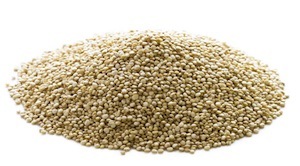Quinoa is a crop that’s primarily grown in Peru. It’s often described as a grain although, technically, is not one and is actually more closely related to spinach and beets. It’s grain comparisons, however, are the result of its edible seeds, which are milled and used in a fashion similar to flour. Quinoa has been a dietary staple in several South American countries for many years. Recently, it has become much more popular in the United States, Canada, and Asia because of its healthful properties, range of uses, and lack of gluten.

Quinoa is Very Nutritious
Quinoa is a fantastic food choice for many reasons. It has a high protein quality and several other nutritional properties. Quinoa has a great amino acid balance and near-ideal proportion of omega-6. It is an important source of minerals and vitamins, especially vitamin E. Additionally, quinoa contains polyphenols, phytosterols, and flavonoids, which are thought to offer nutraceutical benefits; and it has high antioxidant activity. Quinoa is also very usable; it has functional characteristics such as solubility, freeze stability, and gelation that allow it to be used in many ways. [1] [2]

Quinoa is a Satisfying Food
A food’s satiety is its ability to make you feel full. Believe it or not, many of the very tasty foods that are popular in the modern western diet lack this quality — which is probably why it’s a little too easy to eat an entire bag of chips in one sitting. The Department of Food Science and Microbiology at the University of Milan compared the satiety of alternative crops, including quinoa, with wheat and rice. The result? The satiety for alternative crop foods was highest; white bread was the least satisfying food. Because quinoa satisfies your appetite and satisfies it quicker than less nutritious food, it has garnered attention for its potential to impact eating behavior (specifically, making you eat less). [3]
Quinoa is Excellent for a Gluten-Free Diet
Gluten sensitivity and allergies are increasingly common; one of the most common related conditions is celiac disease. Celiac disease is a chronic redness and irritation of the intestines and it’s triggered by dietary gluten. Persons with celiac disease simply cannot consume gluten-containing foods in any amount; the only solution for relief is to follow a gluten free diet. [4]
Because persons with celiac disease have to follow a limited diet, it’s relatively common for them to experience minor nutritional deficiencies. The Department of Gastroenterology at King’s College London and Columbia University’s Celiac Disease Center both recommend alternative grain-based foods, like quinoa, as an important source of nutrients for patients with celiac disease. [5] [6] Read more
No comments:
Post a Comment